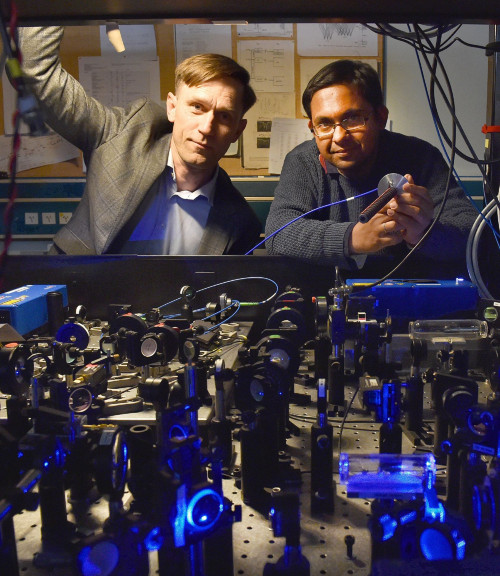2023 Hector Medal: Distinguished contributions to understanding of ‘indistinguishable’ particles

Professor Niels Kjærgaard has been awarded the Hector Medal by Royal Society Te Apārangi for his outstanding contribution to the advancement of scientific understanding of fundamental particles, through experimental studies of atomic collisions and light-scattering using ultracold gases.
Niels is a Professor of Physics at the University of Otago, and a Principal Investigator of the Dodd-Walls Centre. His research group is focused on quantum scattering, studying how ultracold atoms collide and how they interact with light. This research has enabled better understanding of the collective properties and behaviour of atoms in extreme states in which their motion is dominated by quantum mechanics.
Since coming to the University of Otago in 2010, Niels has built an ultracold atom machine which uses powerful laser beams to create clouds of potassium and rubidium atoms at temperatures of less than a millionth of a degree above absolute zero.
He and his team have used this machine to study the scattering of light from atoms in these quantum gases, and the interactions between their atoms as they collide.
Such studies follow on from those pioneered by New Zealand’s most famous scientist, Ernest Rutherford.

As explained by Niels’ nominator: “at ultralow temperatures, atoms undergo an identity crisis where their intrinsic indistinguishability profoundly affects their dynamics according to which of the two types of particles they belong to: bosons or fermions”.
The Pauli exclusion principle allows only one fermion in each quantum state (and this underpins the orbital structure of atomic electron clouds). “When indistinguishable fermionic atoms collide, this gives rise to a spectacular effect where atoms cannot scatter sideways.”
Royal Society Te Apārangi presented the 2017 Hatherton Award to Niels’ PhD student Ryan Thomas for the observation of this ‘no side-stepping’ phenomena, which was published in Nature Communications.
In 2021, Niels’ group showed that ultracold temperatures suppressed the ability of the atoms to scatter light, making the gases more transparent. The research demonstrated and extended scientific understanding of the Pauli exclusion principle, which places fundamental constraints on where certain atomic particles can be located. This blocking of light-scattering had been predicted 30 years previously, and Niels’ team’s experimental observations were published in Science Magazine, and selected as one of the top-10 breakthroughs in 2021 by Physics World.
A referee says Niels has “performed unique and highly regarded experiments by controlling the collision parameters with exquisite precision, and has significantly advanced our understanding of the collisional processes”.
A further referee says, “Results like this require a consistent emphasis on excellence and the consolidation of experimental know-how.
“Niels provides an outstanding example of how to succeed at the highest levels of science. He sets ambitious goals, maintains the highest standards of scientific rigour, and acts always with integrity and professionalism. He had made exceptional contributions to the field of ultracold atoms and has achieved international recognition for the work he has done in New Zealand.”
Niels is also held in high esteem as a mentor and research group leader: “He encourages and supports every member of his group, and ensures they receive full recognition for their work.” In 2018 his team won University of Otago Research Group of the Year.
Niels is passionate about communicating science to the public, particularly young people. In 2021, he co-edited a special issue of the Journal of the Royal Society of New Zealand marking the 150th anniversary of Rutherford’s birth and contributed a review paper on the scattering of indistinguishable particles in the quantum mechanical realm aimed at a non-specialist audience.
Reflecting on winning this award, Niels said: “Coming from a different cultural background, it is heartwarming for my inner Viking to receive this New Zealand recognition for what my team has pulled off in the laboratory. This would not have been possible without ‘people, people, people’, joining in from all corners of the world and the land of the long white cloud to lend substance to Rutherford’s strong belief that “science should be international in its outlook and should have no regard to political opinion, creed, or race”.
“I am immensely honoured to have been at the helm on this tribe’s journey into the quantum world of atoms, and so proud of what loyal and collegial members of my group have achieved during the course of this and beyond. I hope that the award of the Hector medal might help bringing our work to the attention of a wider Kiwi audience and stimulate interest in fundamental science and the scientific method, not least amongst young people.”
Hector Medal:
The Hector Medal is awarded annually to a researcher for outstanding contributions to the advancement of either chemical, physical, mathematical, or information sciences.
Citation:
To Niels Kjærgaard for fundamental scientific studies on atomic collisions and light scattering using ultracold gases.
